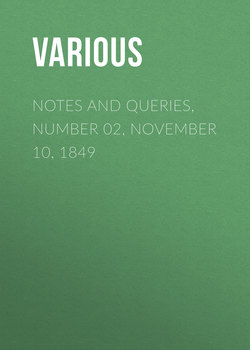Notes and Queries, Number 02, November 10, 1849

Реклама. ООО «ЛитРес», ИНН: 7719571260.
Оглавление
Various. Notes and Queries, Number 02, November 10, 1849
A MEDIUM OF INTER-COMMUNICATION FOR LITERARY MEN, ARTISTS, ANTIQUARIES, GENEALOGISTS, ETC
A FEW WORDS TO OUR FRIENDS
BISHOP AYLMER'S LETTER, AND THE POEM ON THE ARMADA
QUERIES ANSWERED, NO. 1
NOTES UPON "NOTES, NO. 1."
QUERY AS TO REFERENCES
LINES IN THE STYLE OF SUCKLING
NOTES UPON ANCIENT LIBRARIES
PEDLAR'S SONG ATTRIBUTED TO SHAKSPERE, AND TRADITION CONNECTED WITH SHAKSPERE'S "HAMLET."
SIR WILLIAM SKIPWYTH, KING'S JUSTICE IN IRELAND
THE THISTLE OF SCOTLAND
CAPTURE OF THE DUKE OF MONMOUTH
SERPENTS' EGGS AND STRAW NECKLACES
MADOC—HIS EXPEDITION TO AMERICA
NOTES ON COFFEE
DR. DRYASDUST
MACAULAY'S "YOUNG LEVITE."
SERMONES SANCTI CAROLI BORROMÆI
LUTHER AND ERASMUS
TOWER ROYAL—CONSTITUTION HILL—COUNTESS OF PEMBROKE'S LETTER—TENNISON'S FUNERAL SERMON ON NELL GWYNNE
GROG—BISHOP BARNABY
NOTES FROM FLY-LEAVES, NO. II
BODENHAM, OR LING'S POLITEUPHUIA
COLLEY CIBBER'S APOLOGY
A MAIDEN ASSIZE—WHITE GLOVES
BOOKS AND ODD VOLUMES WANTED TO PURCHASE
NOTICES TO CORRESPONDENTS
Отрывок из книги
In our opening Address we carefully avoided any thing at all approaching to a boast of what we would, or even what we hoped to perform. We stated that "we would rather give a specimen than a description." We are now in like manner unwilling to point as exultingly, as we think we might, to the position which we have already taken. But there is a vast difference between vain boasting and the expression of an honest satisfaction; and it would be worse than an affectation of humility—it would be a mean hypocrisy—if we did not express heartily and unreservedly the gratitude we owe and feel to those who have encouraged us by their friendly advice and able pens. We have opened a Literary Exchange, and we have had the gratification to see that men whose learning and talents the public recognise—leaders in their several branches of inquiry—have at once taken advantage of it. They have proved the necessity for some such medium of communication, as well as their good-will to the one now offered to them, by a gathering in its behalf which the public will respect, and of which we may well feel proud.
Some whose good opinion we most value, and who have spoken most warmly in favour of our plan, have proved the sincerity of their praise by suggestions of improvement in its detail, and hints for its further extension. They may feel assured that such hints and such suggestions shall not be lost sight of. For instance, one respected correspondent hints that as we have very properly adopted Dr. Maitland's suggestion with regard to Herbert's edition of Ame's Typographical Antiquities, namely, that of "offering a receptacle for illustrations, additions, and corrections," and invited "our readers to take advantage of our columns to carry out Dr. Maitland's suggestions," we should open our columns with equal readiness to the correction and illustration of more modern and more popular works. We entirely concur with him; but in reference to this subject there is a distinction which must be borne in mind. Our own literature, like that of every other country, consists of two classes of books. We have the books of pretenders to knowledge, the hasty, crude, imperfect, but often for the time attractive and popular volumes of the Ned Purdons of the day. These books have a use—such as it is—and thus answer their purpose; but it would be for the credit of our literature, and save a world of trouble, if they were forgotten as soon as they had done so. To illustrate such books, to add to their information or correct their blunders, would be useless and almost ridiculous. They should be left to die of mere powerlessness and exhaustion, or to wither under the wholesome influence of a just and manly criticism.
.....
Another correspondent—a bibliographical friend—suggests that, for various reasons, which bibliographers will appreciate, our Prospectus should have a place in the body of our work. We believe that many of our readers concur in a wish for its preservation, and it will therefore be found in the Number now before them.
One suggestion again urges us to look carefully to Foreign Literature, and another points out the propriety of our making our paper as British as possible, so that our topographical facts should, as far as practicable, be restricted to the illustration of British counties, and our biographical ones to such as should contribute towards a Biographia Brittanica.
.....